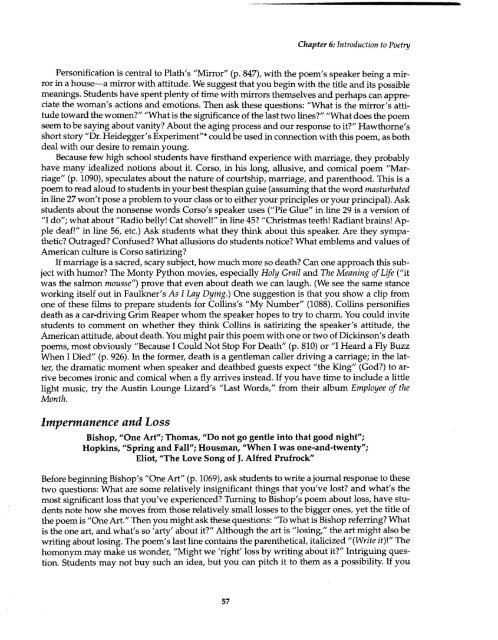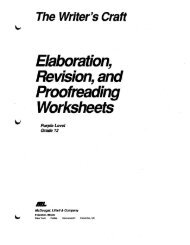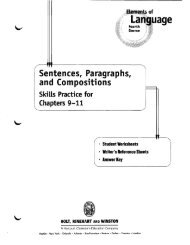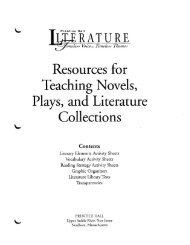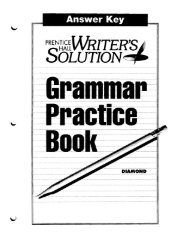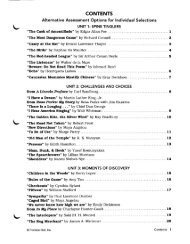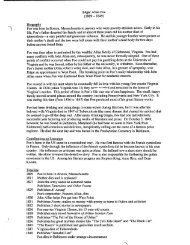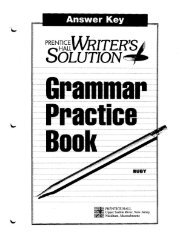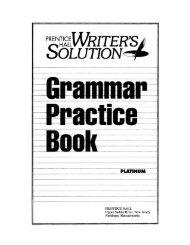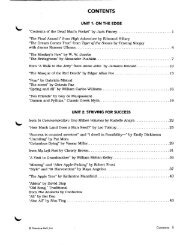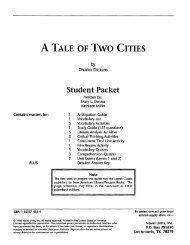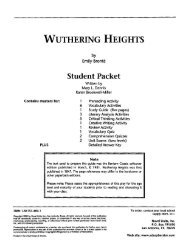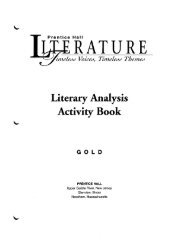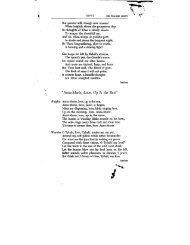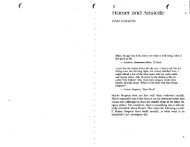English Literature & Composition - PopulationMe.com
English Literature & Composition - PopulationMe.com
English Literature & Composition - PopulationMe.com
Create successful ePaper yourself
Turn your PDF publications into a flip-book with our unique Google optimized e-Paper software.
Chapter 6: Introduction to Poetry<br />
Personification is central to Plath's "Mirror" (p. 847), with the poem's speaker being a mirror<br />
in a house-a mirror with attitude. We suggest that you begin with the title and its possible<br />
meanings. Students have spent plenty of time with mirrors themselves and perhaps can appreciate<br />
the woman's actions and emotions. Then ask these questions: "What is the mirror's attitude<br />
toward the women?" "What is the significance of the last two lines?" "What does the poem<br />
seem to be saying about vanity? About the aging process and our response to it?" Hawthorne's<br />
short story "Dr. Heidegger's Experiment"* could be used in connection with this poem, as both<br />
deal with our desire to remain young.<br />
Because few high school students have firsthand experience with marriage, they probably<br />
have many idealized notions about it. Corso, in his long, allusive, and <strong>com</strong>ical poem "Marriage"<br />
(p. 1090), speculates about the nature of courtship, marriage, and parenthood. This is a<br />
poem to read aloud to students in your best thespian guise (assuming that the word masturbated<br />
in line 27 won't pose a problem to your class or to either your principles or your principal). Ask<br />
students about the nonsense words Corso's speaker uses ("Pie Glue" in line 29 is a version of<br />
"I do"; what about "Radio belly! Cat shovel!" in line 45? "Christmas teeth! Radiant brains! Apple<br />
deaf!" in line 56, etc.) Ask students what they think about this speaker. Are they sympathetic?<br />
Outraged? Confused? What allusions do students notice? What emblems and values of<br />
American culture is Corso satirizing?<br />
Ifmarriage is a sacred, scary subject, how much more so death? Can one approach this subject<br />
with humor? The Monty Python movies, especially Holy Grail and The Meaning of Life ("it<br />
was the salmon mousse") prove that even about death we can laugh. (We see the same stance<br />
working itself out in Faulkner's As I Lay Dying.) One suggestion is that you show a clip from<br />
one of these films to prepare students for Collins's "My Number" (1088). Collins personifies<br />
death as a car-driving Grim Reaper whom the speaker hopes to try to charm. You could invite<br />
students to <strong>com</strong>ment on whether they think Collins is satirizing the speaker's attitude, the<br />
American attitude, about death. You might pair this poenl with one or two of Dickinson's death<br />
poems, most obviously "Because I Could Not Stop For Death" (p. 810) or "I Heard a Fly Buzz<br />
When I Died" (p. 926). In the former, death is a gentleman caller driving a carriage; in the latter,<br />
the dramatic moment when speaker and deathbed guests expect "the King" (God?) to arrive<br />
be<strong>com</strong>es ironic and <strong>com</strong>ical when a fly arrives instead. If you have time to include a little<br />
light music, try the Austin Lounge Lizard's "Last Words," from their album Employee of the<br />
Month.<br />
Impermanence and Loss<br />
Bishop, IIOne Art"; Thomas, liDo not go gentle into that good night"; <br />
Hopkins, IISpring and Fall"; Housman, "When I was one-and-twenty"; <br />
Eliot, liThe Love Song of J. Alfred Prufrock" <br />
Before beginning Bishop's "One Art" (p. 1069), ask students to write a journal response to these<br />
two questions: What are some relatively insignificant things that you've lost? and what's the<br />
most significant loss that you've experienced? Turning to Bishop's poem about loss, have students<br />
note how she moves from those relatively small losses to the bigger ones, yet the title of<br />
the poem is "OneArt." Then you might ask these questions: "To what is Bishop referring? What<br />
is the one art, and what's so 'arty' about it?" Although the art is "losing," the art might also be<br />
writing about losing. The poem's last line contains the parenthetical, italicized "(Write it)!" The<br />
homonym may make us wonder, "Might we 'right' loss by writing about it?" Intriguing question.<br />
Students may not buy such an idea, but you can pitch it to them as a possibility. If you<br />
57


